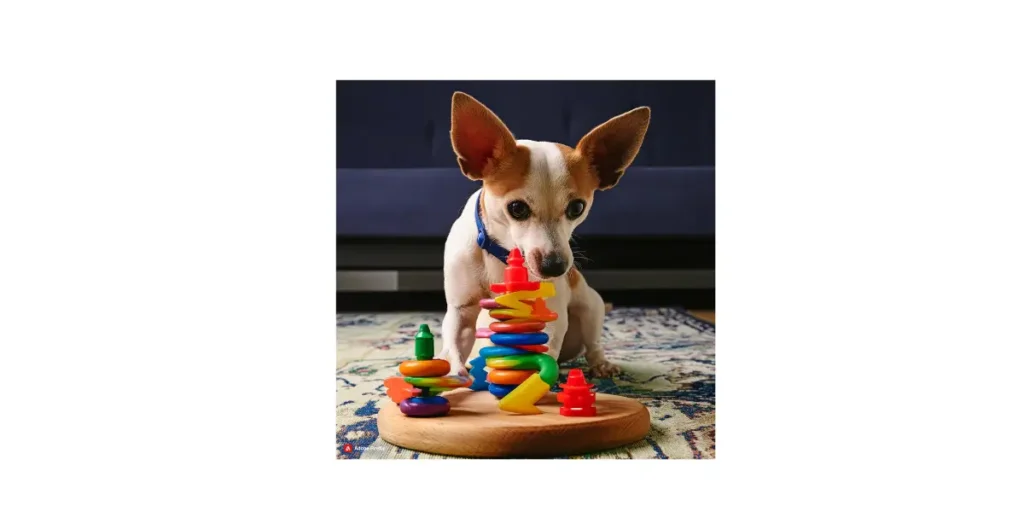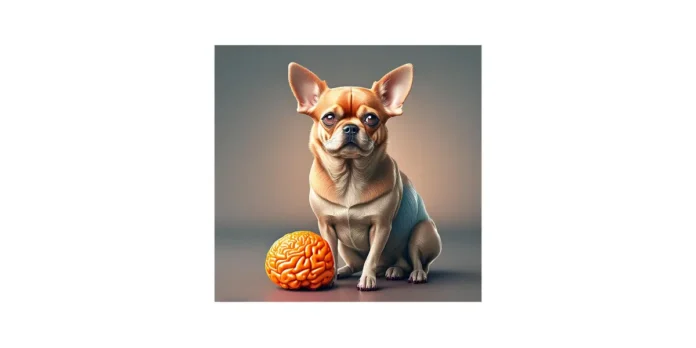Table of Contents
Introduction
You also would have been curious about the size of Chihuahuas’ brains once in your lifetime. Chihuahuas, merely 6-9 inches above ground, are one of the intelligent breeds of dogs. Although they possess a small brain, their intelligence surpasses many big animals. They are adaptable and quite observant of their environment. They exhibit intelligence through problem-solving, adaptability and friendliness with their masters. This keen intellect is surprising due to the relatively smaller size of their brains.
The inquiry into the cerebral dimensions of Chihuahua has persisted through the ages. Digging into the details of their cognitive faculties grants us a glimpse of the captivating realm inhabited by these pint-sized pets.
The brain of Chihuahua scales at approximately 55-56 grams i.e., 1.95-2 ounces. It may seem trifling as compared to other canines but it leads them to top in brain-to-body ratio. As they weigh around 2 to 6 pounds. Hence, they are not merely clever but also quick learners.
Despite their small brain size, Chihuahuas have excellent memory capabilities and are always active and alert. They demonstrate versatility and adeptness, providing them with the capability of companionship. Chihuahuas may be tiny, yet perceptions regarding their cerebral dimensions are often misinterpreted. Their intelligence does not lag behind that of other breeds.
| Key Takeaways | Description |
| Brain Size and Intelligence | Chihuahuas have small brains (approximately 55-56 grams), but their high brain-to-body ratio makes them intelligent, adaptable, and quick learners. |
| Unique Cognitive Traits | Despite their small size, Chihuahuas demonstrate emotional intelligence, forming strong bonds with their owners and keenly observing their environment. They can understand and respond to human emotions, showcasing adaptability and loyalty. |
| Training and Behavior | Chihuahuas can be challenging to train in obedience but respond well to adaptive training and positive reinforcement techniques. They are known for their lively nature, loyalty, and protectiveness towards their owners. |
| Health Concerns | Chihuahuas are prone to brain-related diseases like hydrocephalus, encephalitis, and senior dog dementia. Regular brain stimulation activities and physical exercise are essential for maintaining their brain health and overall well-being. |
How Intelligent are Chihuahuas?

As discussed above, Chihuahuas are an intelligent breed of dogs. They have the capability of adaptability, cleverness and problem-solving. Once, I also owned a chihuahua. It had a distinctive theory of mind. In other words, he was intelligent enough to differentiate the information available to him and others. It was also capable of manipulating the cats into feeding him. It could also pick up when I forbade the cats from a certain action (like messing up in the kitchen) and would police them to make sure they don’t. However, it would also compulsively bark at anyone who came in the door even if it recognized them. It was difficult to interpret whether it was an innate behaviour or just a habit. Decoding Dog Behavior: Exploring Factors Behind Canine Dog Biting
Nevertheless, as per my experience with pets, I am sure that some breeds are quite dumb, while some are always way too smart for their good, but from what I have observed this seems to have nothing to do with size but breed function. It’s all fascinating. The independent hunters are the most intelligent dogs while their companion breeds tend to be less intelligent. And those of companion hunters are somewhere in between. They lack common sense.
How Big is the Size of Chihuahuas’ Brain?
A Chihuahua’s brain weight is 55.10 grams or 1.94 ounces with 1.8cm width and 3.2cm length. Its total weight is around 7.6 pounds. In percentage, a Chihuahua’s brain weight is just about 1.6% of its body weight. Humans have around 2% of brain weight as compared to their bodies.
Even though, it seems they have a small body-to-brain ratio, it is one of the highest among the dogs. Thus, they are very clever and quick at solving problems. Moreover, they have super memory. They can easily learn and perform actions. This makes them one of the lovable pets.
Comparison with Other Breeds and Species
Recent studies have revealed that Chihuahuas have a large volume of the brain as compared to its volume of body. Its brain size is similar to the brain size of tangerine.
It is found that the normal ratio of body to brain weight among different breeds of dogs is 125:1. It is similar to the tangerine. About all of the canines have a similar body-to-brain ratio. Thus, Chihuahuas also have the same brain mass i.e., 1.94 ounces. However, as it is smaller in size and height than others, its brain size is considered bigger than other breeds. This makes it more intelligent than others. They can respond to different human emotions and learn different behaviours from environments.
Additionally, there are many similarities between the brains of humans and dogs. Humans and dogs share more than 80% of DNA. They both have similar patterns in the voice areas of the brain. Hence, dogs can understand human emotions and respond to them. The size of Chihuahuas’ brains is adequate for emotional attachment and understanding of humans.
Distinctive Features
There are distinctive features of Chihuahuas that make them unique. While they may not possess the analytical skills of Border Collies or German Shepherds, they exhibit intelligence in different ways.
Physical features are usually the first thing that separates a species from others. The rounded “apple” head is the hallmark that makes Chihuahuas unique from other breeds of dogs. They have erect ears along with expressive luminous eyes. They have coats that have different colours, patterns and lengths.
Not only physical appearance but certain other traits make them stand out from others.
Firstly, Chihuahuas are quick learners, particularly when it comes to instructions and quirks. They are easy to train. Positive reinforcement techniques have proved to be useful for their training. Their intelligence also manifests in their ability to adapt to various environments and circumstances, making them well-suited for apartment living or travelling.
Furthermore, Chihuahuas are keen observers and emotionally intelligent. They can immediately understand their owner’s emotional needs. Thence, they form strong bonds with humans. They are also creative and systematic. They use different creative techniques to adapt to their environment.
Nevertheless, every Chihuahua has a different level of intelligence. Intelligence depends on various other factors like genetics, nurturing and socialization. Generally, while they may not be the most intelligent canines, Chihuahuas possess a unique blend of intelligence, flexibility, and charm that attracts many dog lovers.
Typical Behavior of Chihuahua

Like other dogs, Chihuahuas are loyal, lively and quick-witted. They are extremely calm and friendly. They have good temperament.
The dynamic and vigilant nature of Chihuahuas makes them good watchdogs. Moreover, they have good bonds with their owners. And they are protective of them in risky situations. However, they are wary of strangers. They have an unusual ability to hear strangers. They can listen to them before you.
Barking, burrowing and affection are some of the typical behaviours of Chihuahuas. How Do Apologize When Your Dog Bites Someone?
Are There Any Struggles in Training Chihuahuas?

Generally, Chihuahuas are relatively easier to train. Their smaller size and unique personality, however, make it harder for owners to rear them. They can resist following commands. As per a study, Chihuahuas had poor performance in “obedience training” which is a part of intelligence. In other words, it is difficult to make Chihuahuas following certain instructions. They can be unruly.
However, they are good at adaptive training. They are good at problem-solving and learning from their surroundings. They show good responses when trained using positive reinforcement. By rewarding them and praising them for good behaviour, Chihuahuas can easily be trained.
Chihuahuas’ Intelligence and Cognitive Traits
| Aspect | Details |
| Brain Size and Intelligence | Chihuahuas have small brains (approximately 55-56 grams), but their high brain-to-body ratio makes them intelligent, adaptable, and quick learners, excelling in memory and problem-solving. |
| Unique Cognitive Traits | Despite their small size, Chihuahuas demonstrate emotional intelligence, forming strong bonds with their owners and keenly observing their environment. They can understand and respond to human emotions. |
| Training and Behavior | Chihuahuas can be challenging to train in obedience but respond well to adaptive training and positive reinforcement techniques. They are known for their lively nature, loyalty, and protectiveness towards their owners. |
Diseases Related to Brain Size in Chihuahuas
Hydrocephalus, Encephalitis and senior Dog Dementia are some of the common diseases in dogs. They mainly occur due to abnormal brain sizes of brains. Let us delve into the details of these diseases.
Hydrocephalus:
in this disease, the size of the Chihuahuas’ brain increases as it swells due to the accumulation of cerebrospinal fluid (CSF) in the brain. The swelling alters the regular shape of the Chihuahuas’ skull due to its pressure on the skull. The skull becomes dome-shaped and unfused. Thus, it results in several other complications. It is also called “water on the Brain”. Open fontanelles (soft spots at the top of the head where the skull is not formed) and small size can be reasons for hydrocephalus in Chihuahuas. Its symptoms include a swollen head, hollow eyes, seizures and behavioural changes.
Encephalitis
Encephalitis in Chihuahuas refers to inflammation of the brain. It can occur due to viral, bacterial or autoimmune infections. In Chihuahuas, it can particularly be due to certain viral infections. Fever, lethargy, seizures, behavioural changes, and neurological deficits are some of its symptoms. Small Chihuahuas are more vulnerable to this disease due to their brain size. Medication such as anti-inflammatory drugs and antiviral or antibiotic therapy can help treat encephalitis. Owners must be watchful and seek immediate veterinary help in case of encephalitis.
Senior Dog Dementia
Senior dog dementia also called canine cognitive dysfunction (CCD), can affect Chihuahuas as they age, just like any other dog breed. CCD is a neurological disease that is similar to Alzheimer’s disease in humans. Its symptoms include disorientation, irregular sleeping patterns, decreased communication with their owners, and loss of house training.
CCD is an incurable disease. However, various management strategies like organized routine, mental stimulation, environmental improvement, and nutritional supplements can improve their cognitive function. Veterinary consultation is important to control behavioural changes and to develop an accurate management plan.
How Can Chihuahuas’ Brain Health be Maintained?

The diseases discussed above can be prevented by maintaining the brain health of Chihuahuas. Brain stimulation and regular physical exercise can help improve the overall health of Chihuahuas and extend their lifetime.
Brain Stimulation
Brain stimulation refers to techniques that affect brain activity. It helps in cognitive development, treating neurological diseases and enhancing brain activity. Brain stimulation in Chihuahuas can help in improving cognitive functions and stimulating overall mental health. Interactive toys, puzzles and games like hide-and-seek are the most effective activities that improve problem-solving skills. As they use their brain to solve tasks and make patterns. Moreover, obedience training and training exercises can also stimulate brain health along with rearing them.
Positive reinforcement techniques help Chihuahuas learn new commands and tricks that strengthen their mental capabilities and help in making stronger bonds with owners.
In all, brain stimulation for Chihuahuas can enhance their mental and emotional intelligence. Consultation with a veterinarian, thus, must be done for tailoring brain stimulation activities according to the health of Chihuahuas.
Physical Exercise
Regular physical health is an essential activity for improving the brain health of Chihuahuas. Physical exercises like daily walks, interactive games and playtime can be beneficial for their mental health. This exposes them to new stimuli that enrich their overall mental intelligence. Games like hurdle races and balancing can not only improve their physical health but also improve cognitive functions.
Furthermore, interaction with other dogs can also help in social stimulation and improve their communication skills. Thus, physical exercises can improve the overall health of Chihuahuas as they help in blood circulation which improves brain functioning.
Health Concerns and Maintenance
| Health Concern | Details |
| Brain-Related Diseases | Chihuahuas are prone to conditions like hydrocephalus, encephalitis, and senior dog dementia. |
| Hydrocephalus | Characterized by the accumulation of cerebrospinal fluid in the brain, causing a swollen head and potential behavioral changes. |
| Encephalitis | Inflammation of the brain due to infections, presenting symptoms like fever, lethargy, and seizures. |
| Senior Dog Dementia (CCD) | Similar to Alzheimer’s in humans, with symptoms including disorientation and decreased communication. |
| Brain Health Maintenance | Regular brain stimulation activities, interactive toys, puzzles, and physical exercise are essential for maintaining brain health and overall well-being. Consultation with a veterinarian is advised. |
Conclusion
To sum up it all, the brain size of Chihuahuas may seem small but it is highest among the canines. Thus, they are one of the most intelligent dogs. They have, however, different ways of demonstrating their intelligence. Due to their small size, their body-to-brain ratio is greater which makes them good at problem-solving and easy to train. Moreover, Chihuahuas also struggle with many brain diseases. Their brain health, therefore, must be maintained by different brain-stimulating activities and physical exercise. Hence, their owners must consult with a veterinarian and maintain their brain health.
Chihuahuas, moreover, are tiny but they are the most loved pets. Their ability to form strong emotional bonds with their owners makes them a good companion to humans. They can recognize different emotions and help humans overcome difficult situations by providing them with emotional validation. They are also loved for their protective nature as they are always alert. Thus, chihuahuas are among the top chosen dogs.
FAQS
Q.1: Do Chihuahuas have the biggest dog brain?
Ans: Chihuahuas do not have the largest brains among dogs. Brain sizes vary among different breeds of dogs. Their brain sizes are proportional to the size of their brains. However, due to their smaller sizes, they have larger brain volumes than other breeds.
Q.2: Can Chihuahuas feel love?
Ans: Chihuahuas experience different emotions including love and affection. They form strong bonds with their owners. They have good emotional intelligence. They often show affection by cuddling, licking and wagging their tails.
Q.3: Why are Chihuahuas so special?
Ans: Chihuahuas are special because of their unique personality, confidence, intelligence and boldness. Moreover, they form emotional bonds with their owners and are extremely loyal to them. They also have longer lifespans hence, they fulfil the emotional needs of humans for a longer time. They are versatile and easy to train. These characteristics, therefore, make them special and beloved.
Q.4: Are Chihuahuas shy?
Ans: Chihuahuas express different emotions. they can be shy at times but it is not their universal trait. It can vary from individual to individual based on their personality, genetics and socialization. However, they are usually awkward and reserved in new situations.
Q.5: Do Chihuahuas know when you cry?
Ans: Chihuahuas, like other dogs, can detect different emotions of humans. They are sensitive to human emotions and can recognize when their owners exhibit emotions like distress or upset. When humans cry, they show different behaviours like sobbing and sniffing. Chihuahuas, thence, recognize these behaviours and console them.
Q.6: Can Chihuahuas smile?
Ans: Chihuahuas can show facial expressions that are similar to smile but they cannot smile like humans. Their eyes become soft, their face becomes relaxed and open their mouth when they are content. When they show these behaviours, they resemble a smile.

